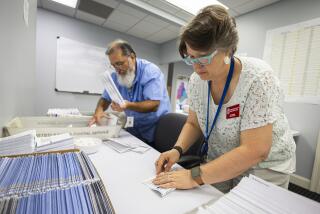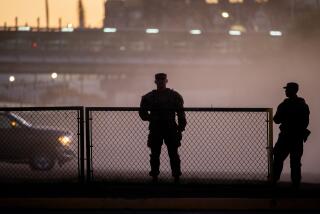New Absentee Law Stirs Up Texas Politics
- Share via
AUSTIN, Tex. — The Texas primary isn’t until March 13, but balloting has begun under the state’s new “no excuse” absentee voting system, which politicians say has made big changes in the way they campaign.
This is the first governor’s race under the 1987 extended voting law, which lets Texans cast ballots during a period that began Feb. 21 and ends March 9.
Before 1987, absentee voting was allowed for about 10 days, and voters needed a valid excuse to cast an absentee ballot--a trip out of their home county, for instance. Now, voters just have to show up at select polling places, such as county courthouses, and cast their ballots.
In the 1988 presidential primaries, ballots cast before election day more than doubled compared to the 1984 primary, results showed.
George Bayoud, Texas secretary of state, said the new law gives voters no excuse not to vote in the primary.
“Those old excuses about being turned off by having to stand in long lines or having to take off work on a weekday are no longer valid,” he said.
Bayoud planned to vote absentee and make several public appearances to tout the new law.
His spokesman Mark Toohey said: “This will be a bellwether. This will be a good test to see how many people this attracts to the polls.”
The relaxed requirements pose new challenges for candidates, said Diane Sheridan, president of the League of Women Voters.
“The extended absentee voting creates a need for extended information,” Sheridan said.
Ed Martin, executive director of the Texas Democratic Party, agreed, saying candidates must have television ads running and direct mail arriving each day of the absentee voting period or they stand to lose a certain number of voters.
Most of the gubernatorial candidates have developed strategies aimed at absentee voters. Republican rancher and oil man Clayton Williams notified 100,000 potential supporters of absentee voting locations and times.
“It will be too little, too late,” for candidates who don’t have successful absentee voting programs, said Williams’ state co-chairman, Roy Barrera Jr.
The new law means more campaign spending in a state with 17 million people and 21 television markets. The seven major GOP and Democratic candidates already have spent $20 million, and analysts say the final tab could reach $50 million.
“It forces the candidates to stretch out their media dollars and not just concentrate at the end of the campaign,” said political consultant George Christian of Austin.
Christian said probably 40% of the primary voters will cast absentee ballots. There are approximately 8.2 million voters registered for the primary election.
Democratic and Republican party officials say they will lead absentee voting drives during the November general election campaign, but are letting the candidates handle the effort for the primaries.
Although absentee voting was not reported separately until last year, election officials have tracked absentee voting patterns in major cities and believe the extended, no-excuse law has boosted voter turnout in other races.
For example, in San Antonio, 8,218 walk-in absentee ballots were cast in the 1984 presidential primary. After the new law was implemented, 41,262 people voted absentee in the 1988 presidential primary.
In Houston, absentee votes increased from 4,683 in the 1984 presidential primary to 7,082 in 1988. Absentee voting also jumped in Dallas, from 1,492 to 9,571 in the two presidential primaries, and in Ft. Worth, from 3,099 to 8,822.
But Christian said there is no proof that the law has increased overall turnout, just that a larger portion of the voters have cast early ballots.
More to Read
Get the L.A. Times Politics newsletter
Deeply reported insights into legislation, politics and policy from Sacramento, Washington and beyond. In your inbox twice per week.
You may occasionally receive promotional content from the Los Angeles Times.










